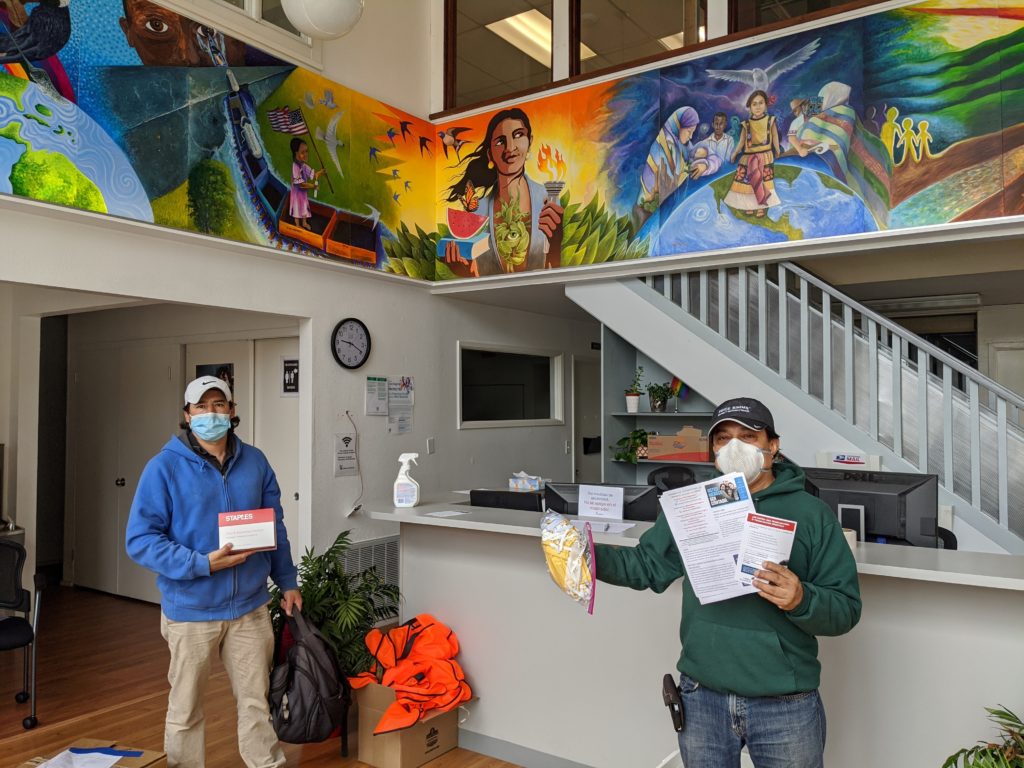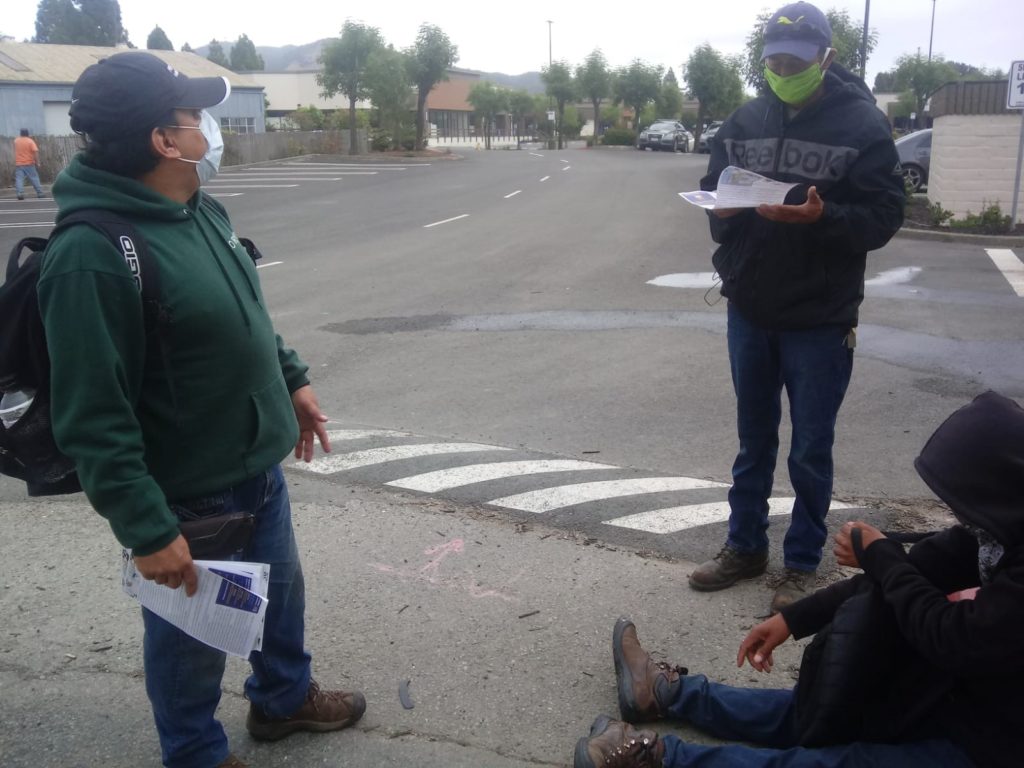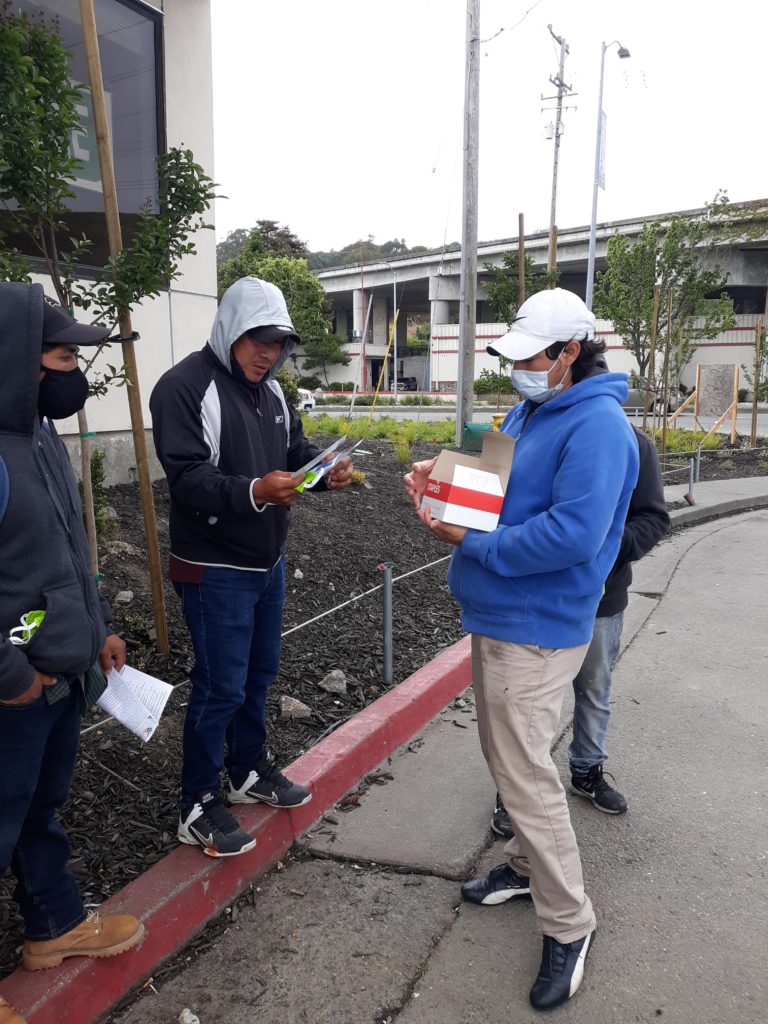Interview with “Promotores de Salud”, Oscar and Ricardo
July 29, 2020
By VALERIA GONZÁLEZ| June 29, 2020
In San Rafael’s Canal neighborhood, there is a segment of the immigrant population that Canal Alliance cannot easily reach. These individuals tend to be isolated and are harder for us to connect with through our regular communication efforts. Because there are no clear bridges to communicate with these groups, our team implemented a solution to identify and train people who are already personally connected to these groups to go out into the community to provide essential educational tools and materials. To ensure that these communities have access to accurate information during the COVID-19 crisis, our strategy has been to train leaders within these groups (for example, day laborers), to go out into their communities as “promotores de salud,” or health promoters.
Oscar and Ricardo were the first community members to help us with this new project. Oscar is 55 years old, originally from Guatemala, and currently lives in Novato. Ricardo is 40 years old, originally from Guatemala, and currently lives in San Rafael. Their role as “promotores de salud” was to talk to the day laborers in the Canal neighborhood who wait in designated spots (“paradas”) to find work. Boys as young as 15 and men up to 60 years of age wait for work at these locations. Most day laborers don’t know anyone or have any family in Marin.
We spoke with Oscar and Ricardo to learn more about their experiences as “promotores de salud”.

How has COVID-19 affected you personally?
Oscar: I lost my regular income due to being laid off back in March. Lately, I’ve been able to work as a day laborer doing different jobs to supplement my income.
Ricardo: The pandemic has affected me in many ways. More than anything, it’s going through something I have not experienced before. Many of us just have to be at home and others have had to stop working completely. At my job, they told me that I couldn’t continue working because of the situation we were in, leaving me without a job. It affected me because I had to stay in my apartment without the hope of getting back to work and not being able to go find another job because all the businesses were closed. Before the pandemic started, I was working evenings at a restaurant. I was unable to work for two months and could not go out to search for new work. Now I go to the “esquinas” (the corners) to wait for work with my colleagues – we’ve seen that there’s some movement there but not much. Sometimes I’m able to find a job for 3-5 hours.
How did you become a health promoter (“promotor de salud”)?
Oscar: I’m involved with Voces del Canal, a project that started around 2012 in partnership with Dominican University to help the Canal community. Omar Carrera [CEO of Canal Alliance], got in touch with me and told me he thought I would be a good fit since I know a lot of people in the community. During that first week I went to the “paradas” in the Canal neighborhood with my friend Ricardo to talk to people and bring them supplies and information about testing and COVID-19. At first it was just me and Ricardo but eventually about 50 new people participated in a training and started knocking door to door in the Canal neighborhood to inform people about the COVID-19 testing centers.
What was your experience like as a health promoter?
Oscar: One Sunday, all the health promotors were assigned to canvass about 50 homes each. That day, a lot of people were very engaged, asked questions and just showed a lot of interest in the information we were providing. Most people were very receptive – they listened to what we had to say. I think they took the information we were providing seriously. Of course, there are some exceptions with some unreceptive individuals, but those were only a few. Overall, it was a very good experience. We would provide masks and information about the testing center and paper flyers with other safety/health information.
Ricardo: First, we received a training about health and what we can all do to protect ourselves from the virus, and how to best get the information out to people. We were responsible for taking all that we learned during the training to our companions in the community and offer them assistance at the same time. So many of the people we talked to were not aware about the things we were teaching them regarding the spread of the virus and how to protect themselves. Many of them were open and willing to receive help from Canal Alliance. Overall, it was a nice and interesting experience to be involved in the project – it’s something I have not done before. I enjoyed doing it because it’s important work and I liked being able to share critical information on behalf of Canal Alliance with my community.

What have you seen happening in your community during this health crisis?
Oscar: There’s not one standard way in which people view this pandemic. Some people don’t take it seriously and think that everything they’re hearing is a lie. On the other hand, there’s people that are taking it very seriously and may have exaggerated views of the situation. What we’re trying to convey to the community is to make everyone aware of the risks, and to take more precautions and measures to stay safe. Measures like using a mask, washing our hands, using hand sanitizers and cleaning and washing more frequently.
Ricardo: The most difficult part right now that we are going through is that there’s not a lot of demand or need in our area for work and so many people are struggling to find work to earn some type of income. The little bit of income we do find goes to feeding our families, but it is not enough to carry us forward during this time. We realize too that there’s not much for us to do since we know that it’s up to the local/national government to make the decisions to improve the situation for us and of course address the public health crisis.
Why is the work you are doing as a “promotor de salud” important?
Oscar: There’s so much information in social media platforms right now about COVID-19, and some people may have incorrect information. The fact that we tell people that Marin County is transmitting accurate and up-do-date information gives them a sense of certainty about what is happening during the pandemic and what precautions the community can take to stay safe.
What keeps you motivated?
Oscar: I really like to study, and now that I have more time during this pandemic, I’ve been able to start learning German from home. I use Duolingo and I’ve found other free resources online to help me learn. Learning keeps me motivated. And because I’ve also had more time, I’ve been able to help as a health promoter in my community.
I know that it’s not easy for other people in my community to find the motivation to learn. My community is full of many hard-working individuals; some didn’t have the opportunity to go to school, and for them, it can be difficult to find the time or motivation to learn. Also, the people who wait for work in the “paradas” don’t have a fixed income and they have a hard time finding work. Others who work in the service industry like hotels and restaurants were laid off and they were not able to stay home and shelter in place because they needed to go out to find work to provide for their families.
What gives you hope?
Oscar: My hope is that God will help us out of this and that this storm will end. We just have to do our part, too, to take precautions. It’s important for us to remember that better days will come. I know many people who have become depressed during this pandemic because all they do is worry. I think that what we have to do is be cautious but not fearful, because fear leads to intense dread and dread leads to depression. It’s important for us to lift up the positive voices in the community that can remind others to be cautious and not get stuck in fear. As long as we all do our part, we’re all going to get through this. What gives me hope is that I know this isn’t going to last forever, and there will be better days.
Ricardo: My love for my children gives me inspiration and energy to keep going. My hope is to one day be with my children and to be in Guatemala, and to be able to share what we have not been able to share here due to many reasons and many challenges. I’m motivated to be in a new place and to be able to enjoy more of my time with my children and to be closer to them.
